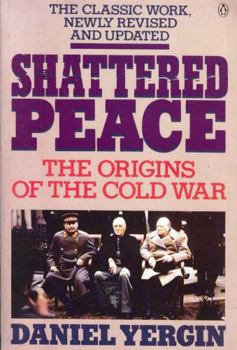Shattered Peace: Revised Edition
Select Format
Select Condition 
Book Overview
This book states rather accurately the reasons, events and the logic for the establishment of the cold war and our present emphasis on our Military Industrial Complex. This was a turning point in... This description may be from another edition of this product.
Format:Paperback
Language:English
ISBN:0140121773
ISBN13:9780140121773
Release Date:April 1990
Publisher:Penguin Group
Length:544 Pages
Weight:0.20 lbs.
Dimensions:0.9" x 6.0" x 8.9"
Customer Reviews
3 ratings
The Hobo Philosopher
Published by Thriftbooks.com User , 17 years ago
This book states rather accurately the reasons, events and the logic for the establishment of the cold war and our present emphasis on our Military Industrial Complex. This was a turning point in American history. Supporters of the conservative type will deny the accuracy of Mr. Yergin's scenario and those who lean more to the left will interpret it as a rather obvious statement of fact. I think that the book is more than accurate. In fact I would say that the book is a little too conservative and that the truth I would find even further to the left. And if we look at our present day politics we will see that it is deja vu all over again. In fact in today's world it does seem that even Stalinist Russia's view of the U.S. is more accurate than most of us would have liked to believe. Books written by Richard Noble - The Hobo Philosopher: "Hobo-ing America: A Workingman's Tour of the U.S.A.." "A Summer with Charlie" "A Little Something: Poetry and Prose" "Honor Thy Father and Thy Mother" "The Eastpointer" Selections from award winning column.
Ultimately missed the point
Published by Thriftbooks.com User , 19 years ago
. . . but still worth a Cold War student's time for its wide-ranging source material, and representative perspective. Yergin's book is long on pointed inference and short on rational argument. He makes his points primarily by choosing his adjectives carefully. The principal impression one is left with is that American policy started the Cold War by misinterpreting Stalin after FDR's demise, and hence sentenced the United States to managing, in perpetuum, a "national security state." (FDR, by contrast, dealt with Stalin as one great power actor to another, unburdened by the "messianism" and "Wilsonian utopianism" with which American foreign policy is so often tagged.) Certainly the proximate origin of the Cold War lay in the fact that the United States was uneasy with Stalin occupying all of eastern Europe, and objected directly to his attempts to set up, through armed force, Communist regimes in Iran, Turkey, and Greece. Yergin implies that because Stalin approached these efforts methodically and carefully, and drew back when confronted, Truman overreacted in accusing him of trying to take over too much of Europe and Asia. Here Yergin suffers a common myopia among Cold War analysts: an apparent inability to see the link between American pushback, or lack of it, and how far the Soviets chose to go. He prefers to interpret both the US and the USSR as actors motivated mainly by confused internal urges, or so one gathers from the profusion of telling adjectives in his narrative. Yergin does do the signal service of charting America's course from a nation that pursued "interests," as in the pre-WWII era, to one that based its fundamental posture in the world on permanently-existing "threats." At least one reviewer (Edward M. Luttwak, in "The Train of History," Commentary, August 1977) considers Yergin's conclusions here vacuous and overblown, observing that a "national security state" is something every state is, by definition. But Yergin's contribution is really in pointing out that American policy was at one time made relatively free of that European-style premise; it was the menace of Soviet expansionism and the Cold War that forced us to adopt it. (John Lewis Gaddis' 1982 book, Strategies of Containment, has a much better theoretical discussion of the distinction between basing national policy on interests, and basing it first and foremost on threats.) Luttwak's review of this book is superb, if you can get your hands on it. (It's collected in his 1980 book Strategy and Politics.) He takes Yergin to task rather severely for including a large amount of "human-interest" material, such as the weather and ceremonial arrangements when FDR arrived at Yalta; and ultimately describes the book as "free of any trace of genuine scholarship." I would give Yergin a little slack on the human-interest front, however. I wouldn't have missed for the world his summary on page 47 of the following exchange between Mrs. Robert Taft and Senator Arthu
Still the best account of the origins of the Cold War
Published by Thriftbooks.com User , 26 years ago
Is this book a 'classic'? If it isn't then I don't know what would qualify for the name. A breath of fresh air when it was first released, it quite nicely debunked the existing interpretations of Liberal National, New Left and (rather fratricidally) the earlier Realist historians. It is meticulously researched and easy to read - it deserves a place on the shelf of every person with an interest in the international affairs of the 20th century, especially as it is now within the price range of most buyers.






